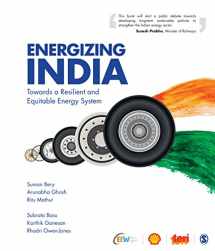
Energizing India: Towards a Resilient and Equitable Energy System
Book details
Summary
Description
This volume explores opportunities and challenges in articulating and implementing a robust but flexible set of strategies for meeting India’s primary energy needs; making the energy system more resilient, in order to drive India’s economic growth, and more equitable, in order to fulfil the basic energy needs of all citizens in an uncertain future. A range of national scenarios is explored to examine possibilities of fuel and technology substitutions along two time horizons: in some detail until 2030 and also mapping out plausible pathways to 2050.
This volume is the first time a tripartite effort has been undertaken by an IOC (Shell) and two reputed think-tanks (CEEW and TERI) to develop a single narrative on energy choices and related issues in India. It combines Shell’s international and energy-specific know-how with CEEW and TERI’s domestic and broader sustainable development experience. Finally, it is unique in its treatment of the energy sector as a whole in India’s development (focusing on both the technology and policy dimensions), and in its engagement with the world (including diplomatic and security dimensions).


We would LOVE it if you could help us and other readers by reviewing the book
Book review



